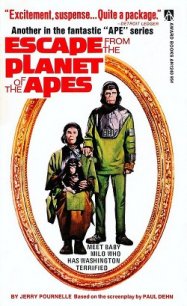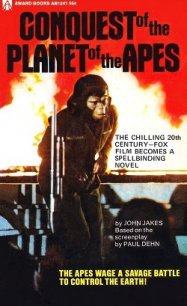Beneath the Planet of the Apes - Avallone Michael (книга бесплатный формат .txt) 📗
There was no sign of Nova beyond the big doors.
But around the stone fountain, capering in the awful white glare of the city’s atmosphere, were a dozen or more children of many races and ages. Their squeals of pleasure sounded grotesque in the daylight. Brent restrained a shudder. The children had ringed the fountain, romping in a dancing circle, their voices gaily blending in a terrible refrain:
Ring-a-ring o’neutrons
A pocketful of positrons
A fission! A fission!
We all fall down!
On the last word, they spilled backward, forming a star shape, and lay deathly still. Like some dreadful parody of an old Busby Berkeley musical dance routine from one of the old Warner Brothers movies of the thirties. Brent shuddered again, remembering—it was only a game, wasn’t it? But . . .
The silent guards egged him on, courteously almost, gently prodding his elbows again. Brent kept on moving. The playing children were soon lost somewhere behind him. The ghastly white complex of the metropolis engaged all of his attention. The tomblike buildings jutting sheer from the barren earth. The all-encompassing glare of white and cold daylight. Dimly he could hear the echoing words of the playing children as they picked up yet another chorus of the deadly song. It sounded like something they had learned by rote. A Child’s Garden of Verses set to the meaning and reality of a terrible code of destruction and doom. Armageddon set to Mother Goose!
It was terrifying.
And he had no idea where Nova was. Or what they might have done to her. Whoever They were.
They!
In his torn-apart and beleaguered intellect, he was no longer able to make any judgments or solve any mental problems. His entire universe of consciousness and stable thinking was awry; he had lost all sense of rhythm, balance and common sense.
He was only hurtingly aware of one great truth.
He had fled from the mockery of the Great Apes into something perhaps twice as alien, a dozen times more hazardous. A hopeless morass of terror, horror and who knew what else?
Meaning—he had jumped from the frying pan directly into the fire.
As perhaps—Taylor had?
It was too early to tell. Too early to tell anything.
He didn’t know.
He might never know.
Blindly, obediently, he suffered himself to be led by the marble-faced guards to another part of this Crazy House forest.
All he did wish, and hope for, with every fiber of whatever of his being still belonged to him by right of his own individuality, was that the girl was all right.
Safe.
Unharmed.
Untouched by the madness that seemed to surround him on all sides. The sheer glare of lunacy that had become a part of all his waking reflexes and responses. And reactions.
Not even H.G. Wells at his wildest, not even Jules Verne, had dared conceive of a civilization dedicated to the Bomb.
This, indeed, was a journey into the Absurd.
And the terribly frightening—
For he knew that he was somewhere on Fifth Avenue and the vaulted building he had just left was St. Patrick’s Cathedral!
9.
MENDEZ
Another white corridor.
Another trip into isolation and weird world-within-worlds.
Brent, flanked by his grim guards, found himself being ushered down a long bare corridor, a narrow passageway which was lined all along the route with uniform busts, honoring some form of dynastic succession. It wasn’t until the last bleak, awesome stone head and shoulders that Brent got any inkling of what he was seeing. This last impressively mounted face had a plaque at its base which proclaimed in etched lettering: MENDEZ XXVI. Mendez the Twenty-Sixth! Brent wagged his head, to clear it of cobwebs.
At last the guards led him through another door.
Into another room.
And another nightmare. In broad daylight.
It was a room shaped like an amphitheater, with curved white walls, the hallway forming a well below. This was where Brent and the two guards stood, waiting for some kind of audience. At the head of the room, Brent could see the living replica of that last bust in the narrow passageway. The same smooth marble face, the luminous eyes, the glasslike rigidity. All of it enveloped in brilliant purple robes, lying like a shroud about the imposing figure of Mendez the Twenty-Sixth, as he sat like a judge presiding in some Supreme Court conclave of this incredible city. Brent stared up at the paradox of five robed inquisitor-rulers, sitting in carved chairs, regarding him with an impassivity of gaze that was bloodcurdling in its lack of human emotion. Brent held his ground, staring back. His eyes, which had been the most important part of his physical tools these last terrible hours, were now fully strung to the maximal pitch of their efficiency. Seeing was believing—but here, in this awful new world, it was also disbelieving. The senses, all five of them, could assimilate only so much.
His eyes swept over Mendez and his court.
He saw a magnificent Negro, robed all in white, his onyx face startling in contrast with his garments. He saw a mountainous fat man, serene and cool, garbed in red robes. To Mendez’s left, there was a woman—a strikingly beautiful woman, whose ivory face rose like an orchid from a gown of sheer blue. To Mendez’s right, a green-robed elder-statesman type—very much like the mysterious verger—squatted prominently. But unlike his companions, this one was almost charming and cheerful in demeanor. Brent was reminded of a Puck, grown to ancient years.
All five of these phantasmagorical figures struck Brent like some odd concatenation of Rembrandt’s famous Syndics of the Cloth Guild. With the terrible difference of an imposed horror. And the fantasy of the Unknown.
He waited, wondering, trying to control the fear moving like a snake in his stomach.
He didn’t realize that the five seated figures, looking down, could see him directly. Or that if they looked straight ahead, they could see, projected on the opposite wall, the visual impress of their own thought projections. Brent had no way of knowing into what technological wonderworld he had stumbled, though his encounter with the verger had given him some advance notice of the miracles to be found in this strange city.
Each “wall image” was projected in color to identify the sender. Thus, white for the Negro, blue for the beautiful girl, red for the fat man, green for the puckish statesman type. And purple for Mendez himself. This Brent was yet to learn, for he could not see the wall behind him.
Nor could he yet fully understand the traumatic hypnosis that the people of this civilization could inflict upon him. As they had done with him at the water fountain in that episode with Nova. Brent’s own stubbornness would bring on such an attack.
The practitioner merely had to close his eyes, project to the wall in his own color scheme, and Brent would remain in pain and agony until the particular inquisitor opened his eyes.
This was the mad world into which Brent had all unknowingly stumbled. The phenomenon of A.D. 3955!
Brent felt himself the target of Mendez, the Negro, the woman, the fat man and the elder statesman.
He knew they were talking to him; he felt it even though he could hear no words, see no lips move, and knew nothing about the wall behind him with its color-scheme code of interrogation.
Mendez said nothing.
The fat man jerked his head ever so slightly.
The far wall lit up in red colors.
“Brent,” Brent answered.
The fat man jerked his head again.




